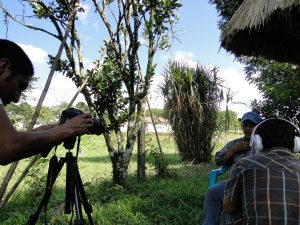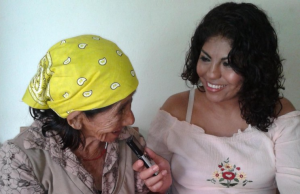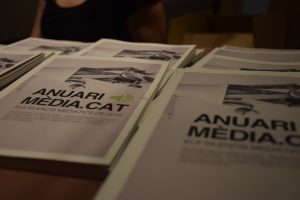11 Apr 2018 | Awards, Fellowship 2018, News
[vc_row][vc_column][vc_video link=”https://youtu.be/fW_rl97IupM”][vc_column_text]MuckRock is a non-profit, collaborative news site used by journalists, activists and members of the public to request, receive and share government documents from any agency that is subject to transparency laws in the United States. Their aim is to make policies more open to the public, and democracies further informed.
“MuckRock has continued to double in size each year,” said MuckRock. “We hope to continue increasing our impact, putting cutting edge transparency tools in the hands of journalists, whistleblowers, researchers and ordinary people to have impact at the national, international, and local levels.”
The site, which has a user base of 10,000, hosts an archive filled with hundreds of thousands of pages of original government materials, as well as information about how to file requests, and tools to make the requesting process easier. MuckRock has filed over 40, 000 requests, shedding light on government surveillance, censorship and police militarisation among hundreds of other issues. The site’s staff and contributors use the documents received through the site to create original investigative reporting and analysis.
MuckRock filed and won a lawsuit against the CIA, which resulted in the release of 13 million pages of previously secret documents from the CREST Database – the CIA’s database of declassified information dating back through the Cold War. The foundation also fought off a lawsuit from multinationals seeking to hide security flaws in their smart metering technology.
Their work investigating the US government’s 1033 programme, which supplied local police and the private prison system with military equipment, helped lead to major reforms of these policies.
Stories that MuckRock have reported on over the past year include: gaps in gun violence data, surveillance footage from the top of the Smithsonian building on inauguration day – contributing to the debate of the true crowd size, and classified CIA documents that were left stashed in the Rockefellers barn.
After he had been in office for over a year, MuckRock investigated the effects of president Trump’s harsher immigration policies, and found that the number of deportations was actually decreasing, while the number of people held in detention centres was rising.
The site has had a particularly successful 2017, seeing its 10,000th public records request successfully completed. They also celebrated International Right To Know day by expanding their reach to Canada, which is ranked a lowly 49th out of 111 countries on the RTI Rating.

The site has also focused on expanding its education about requesting documents, and produced a Freedom of Information Act 4 Kidz lesson plan to help educators to start discussions about government transparency.
“It’s impossible to quantify the impact of this acknowledgement of our amazing transparency community,” said MuckRock. “This nomination recognizes the important work of all the MuckRock users who have fought to open up government on so many issues, often facing bureaucratic hurdles and legal threats to create a strong civic society for all.”
See the full shortlist for Index on Censorship’s Freedom of Expression Awards 2018 here.[/vc_column_text][/vc_column][/vc_row][vc_row full_width=”stretch_row_content” equal_height=”yes” el_class=”text_white” css=”.vc_custom_1490258749071{background-color: #cb3000 !important;}”][vc_column width=”1/2″][vc_custom_heading text=”Support the Index Fellowship.” font_container=”tag:p|font_size:28|text_align:center” use_theme_fonts=”yes” link=”url:https%3A%2F%2Fwww.indexoncensorship.org%2Fsupport-the-freedom-of-expression-awards%2F|||”][vc_column_text]
By donating to the Freedom of Expression Awards you help us support
individuals and groups at the forefront of tackling censorship.
Find out more
[/vc_column_text][/vc_column][vc_column width=”1/2″ css=”.vc_custom_1521479845471{background-image: url(https://www.indexoncensorship.org/wp-content/uploads/2017/05/2017-awards-fellows-1460×490-2_revised.jpg?id=90090) !important;background-position: center !important;background-repeat: no-repeat !important;background-size: cover !important;}”][/vc_column][/vc_row][vc_row][vc_column][vc_basic_grid post_type=”post” max_items=”4″ element_width=”6″ grid_id=”vc_gid:1523523704690-32d26e8d-1852-3″ taxonomies=”10735″][/vc_column][/vc_row]
10 Apr 2018 | Awards, Fellowship 2018, News
[vc_row][vc_column][vc_video link=”https://youtu.be/jPOdNm8Sxos”][vc_column_text]Avispa Midia is an independent online magazine that prides itself on its daring use of multimedia techniques to bring alive the political, economic and social world that is Mexico and Latin America.
“As with avispas (wasps), insects that exist across the world that are equipped with various eyes or ocelli capable of distinguishing between light and dark, Avispa Media seeks to participate in and witness the variety of shades that colour reality,” said Avispa Midia. “We believe that modern-day communication should be nourished by the varied formats and technology that characterise new virtual journalism, such as integrating multimedia tools that make information more dynamic. What sets us apart is our critical, far-reaching eye, primarily through reportage and investigative journalism.”
In the Spanish version, the site’s use of pictures, videos, music and maps to illustrate its stories is particularly striking.
But the beauty of the design masks the serious intent of this collective of journalists and researchers who are seeking to challenge violence and corruption in the region and reflect the lives of marginalised and indigenous people.
They specialise in investigations into organised criminal gangs and the paramilitaries behind mining mega-projects, hydroelectric dams, and the wind and oil industry.
The Latin American world they report on is extremely violent. Between 2000 and 2016, at least 105 journalists were murdered in Mexico for carrying out their work. According to Reporters Without Borders, in 2016 Mexico became third highest country in the world for journalist killings — the most deadly outside war zones.
Avispa Midia says its work has meant that human rights organisations and NGOs have taken action on slave labour and undocumented migrants as a result of their reports.
The site however suffers from scant resources and their main challenge is to be able to establish some form of continuous financing, since they do not have a fixed budget to do their work and no one receives a salary.
Topics that Avispa Midia has addressed in the last year include: US interference in Mexico and Central America; the persecution of peasants in Honduras; land restitution demands by displaced people in Guatemala and the first visit of Mexican president Enrique Peña Nieto to the city of Oaxaca.

Many of the reports in the last 12 months have been focused on Mexico and Central America, where the media group has helped indigenous and marginalised communities report on their own stories by helping them learn to do audio and video editing.
In the future the journalists want to create a multimedia journalism school for indigenous people and young people from marginalised neighbourhoods, so that ordinary citizens can inform the world what is happening in their region, and break the stranglehold of the state and large corporations on the media.
“In a field where war has contaminated even communication, where truths but also actions are disputed, having been nominated for the Index of Censorship award lifts our courage up,” said Avispa Midia. “And it enables us to reaffirm our investment in the truth and the tenacity of the voices and experiences we carry through each word and each image documented by Avispa Midia. For us, this represents respect and appreciation for the work we have done. This means expanding the support of communities, civil organisations and academic groups that supported us against the violence exerted against journalists in Mexico.”
See the full shortlist for Index on Censorship’s Freedom of Expression Awards 2018 here.[/vc_column_text][/vc_column][/vc_row][vc_row full_width=”stretch_row_content” equal_height=”yes” el_class=”text_white” css=”.vc_custom_1490258749071{background-color: #cb3000 !important;}”][vc_column width=”1/2″][vc_custom_heading text=”Support the Index Fellowship.” font_container=”tag:p|font_size:28|text_align:center” use_theme_fonts=”yes” link=”url:https%3A%2F%2Fwww.indexoncensorship.org%2Fsupport-the-freedom-of-expression-awards%2F|||”][vc_column_text]
By donating to the Freedom of Expression Awards you help us support
individuals and groups at the forefront of tackling censorship.
Find out more
[/vc_column_text][/vc_column][vc_column width=”1/2″ css=”.vc_custom_1521479845471{background-image: url(https://www.indexoncensorship.org/wp-content/uploads/2017/05/2017-awards-fellows-1460×490-2_revised.jpg?id=90090) !important;background-position: center !important;background-repeat: no-repeat !important;background-size: cover !important;}”][/vc_column][/vc_row][vc_row][vc_column][vc_basic_grid post_type=”post” max_items=”4″ element_width=”6″ grid_id=”vc_gid:1523523668709-d546d4ac-7872-3″ taxonomies=”10735″][/vc_column][/vc_row]
9 Apr 2018 | Awards, Fellowship, Fellowship 2018, News
[vc_row][vc_column][vc_column_text]Wendy Funes is an investigative journalist from Honduras who regularly risks her life for her right to report on what is going on in the country.
She is a courageous female voice, writing in a violent and corrupt society where two journalists have been killed this year and where women are regularly subjected to severe domestic violence and often killed.
Funes is an inventive and passionate human rights reporter. For one article she got her own death certificate issued so that she could show up the corruption in the civil registration office. For another she dressed as a beggar for an investigation into children being forced to beg on the streets of the country’s capital.
She writes about violence against women, a huge problem in Honduras where one woman is killed every 16 hours, and the number of women killed has increased by more than 260% between 2005 and 2013.
But Funes is also an activist for her profession, which led to her being expelled from the journalism trade union where she had been fighting for labour rights and freedom of expression.
“I have overcome many traumas, including the violent deaths of my father and several friends and fellow journalists, for which no one has been brought to justice,” said Funes. “I will not succumb to despair – every blow has made me a warrior, and every obstacle is a chance to prove that adversity must never stop us. Only those who has suffered dark will search for the light. My way to achieve my life’s purpose is the journalism I love, which quickens my heart in moments of greatest expectation, which brings joy and sorrow. Through independent, self-critical, methodical journalism – the kind that comes from the streets – combined with an academic grounding, I am convinced I can bring change to my country.”
Working for C-Libre, a freedom of expression organisation in Honduras, she highlighted the continued murder of journalists by organising a march which she called the Demonstration of Silence to protest the death of journalists. Protesters carried white cardboard coffins with the faces of each of the journalists on them to the prosecutors’ office in the capital Tegucigalpa.

In 2017 Wendy Funes was helped by PressStart, a global crowdfunding platform for reporters in countries where the press cannot report freely, to write an expose of gang rapes of indigenous Lenca women in the La Paz area of Honduras.
On May 31, 2017 Funes retired from C-Libre to found her own research newspaper and promote investigative journalism in her country, using data with a gendered approach and promoting transparency and access to public information.
“This nomination is like an embrace of trust in the darkness of death and risk implied by the asphyxiating level of censorship that the press experiences in Honduras,” said Funes. “It’s like a hand reaching out to me to tell me it’s worth resisting this corrupt and unfair system.”
See the full shortlist for Index on Censorship’s Freedom of Expression Awards 2018 here.
[/vc_column_text][vc_row_inner][vc_column_inner][vc_column_text]
Wendy Funes y su valiente defensa del periodismo de investigación en Honduras
Wendy Funes es una periodista de investigación hondureña que pone su vida en peligro con regularidad: es el precio que paga a cambio de su derecho a informar sobre lo que está pasando en el país.
Es la valerosa voz de una mujer escribiendo en una sociedad violenta y corrupta, en la que dos periodistas han sido asesinados en lo que va de año. Un país en el que las mujeres sufren violencia doméstica extrema a diario y son a menudo asesinadas.
Funes es una reportera pro derechos humanos ingeniosa y apasionada. Hizo que expidieran su propio certificado de defunción para desvelar en un artículo la corrupción del registro civil. Para otro reportaje, se disfrazó de pordiosera para investigar sobre los niños forzados a mendigar en las calles de la capital del país.
Escribe sobre la violencia contra las mujeres, un problema gravísimo en Honduras, donde matan a una mujer cada 16 horas y la cifra de asesinadas se incrementó más de un 260% entre 2005 y 2013.
Funes también es una activista dentro de su profesión, razón por la cual fue expulsada del sindicato de periodismo desde el que había estado luchando por los derechos laborales y la libertad de expresión.
«He superado muchos traumas, entre ellos, las muertes violentas de mi padre y de varios amigos y compañeros periodistas, por las cuales nadie ha sido llevado ante la justicia», declaró Funes. «No sucumbiré a la desesperación: cada golpe me ha hecho una guerrera, y cada obstáculo no es más que una oportunidad de demostrar que la adversidad nunca debe detenernos. Solo quienes han sufrido la oscuridad buscarán la luz. El modo que tengo para cumplir mi propósito en la vida es el periodismo al que amo, el que hace que se me acelere el corazón en momentos de inmensa esperanza, el que me trae alegrías y tristezas. Con periodismo independiente, autocrítico, metódico —el tipo de periodismo que viene de las calles—, combinado con conocimientos académicos, estoy convencida de que puedo traer el cambio a mi país».
Cuando trabajaba para C-Libre, una organización por la libertad de expresión en Honduras, organizó una marcha a la que llamó la Manifestación del Silencio en protesta contra los continuos asesinatos de periodistas. Los manifestantes cargaron con ataúdes de cartón blanco con retratos de cada uno de los periodistas asesinados hasta la fiscalía de la capital, Tegucigalpa.
En 2017 Wendy Funes recibió apoyo de PressStart, una plataforma de crowdfunding global para reporteros en países donde la prensa no puede informar libremente, con el cual escribió un reportaje destapando las violaciones grupales de mujeres indígenas lencas en la zona hondureña de La Paz.
El 31 de mayo de 2017, Funes se retiró de C-Libre para fundar su propio periódico de investigación y promover este tipo de periodismo en su país, promoviendo la utilización de los datos desde una perspectiva de género, la transparencia y el acceso a información pública.
«Esta nominación es como un abrazo de confianza en la oscuridad de la muerte y el peligro implícitos en el asfixiante nivel de censura que vive la prensa en Honduras», declaró Funes. «Es como si me hubieran extendido una mano para decirme que merece la pena resistir a este sistema corrupto e injusto».
Traducción de Arrate Hidalgo
Accede a la lista completa de nominados a los Index on Censorship’s Freedom of Expression Awards 2018 aquí.[/vc_column_text][/vc_column_inner][/vc_row_inner][/vc_column][/vc_row][vc_row full_width=”stretch_row_content” equal_height=”yes” el_class=”text_white” css=”.vc_custom_1490258749071{background-color: #cb3000 !important;}”][vc_column width=”1/2″][vc_custom_heading text=”Support the Index Fellowship.” font_container=”tag:p|font_size:28|text_align:center” use_theme_fonts=”yes” link=”url:https%3A%2F%2Fwww.indexoncensorship.org%2Fsupport-the-freedom-of-expression-awards%2F|||”][vc_column_text]
By donating to the Freedom of Expression Awards you help us support
individuals and groups at the forefront of tackling censorship.
Find out more
[/vc_column_text][/vc_column][vc_column width=”1/2″ css=”.vc_custom_1521479845471{background-image: url(https://www.indexoncensorship.org/wp-content/uploads/2017/05/2017-awards-fellows-1460×490-2_revised.jpg?id=90090) !important;background-position: center !important;background-repeat: no-repeat !important;background-size: cover !important;}”][/vc_column][/vc_row][vc_row][vc_column][vc_basic_grid post_type=”post” max_items=”4″ element_width=”6″ grid_id=”vc_gid:1523261771179-2e70bbac-7a3c-3″ taxonomies=”10735″][/vc_column][/vc_row]
6 Apr 2018 | Awards, Fellowship 2018, News
[vc_row][vc_column][vc_video link=”https://youtu.be/Kuztv8blNgY”][vc_column_text]
Mèdia.cat is a Catalan website devoted to highlighting media freedom violations and investigating under-reported or censored stories. Unique in Spain, it has been a particularly significant player in the last year when the heightened atmosphere in Catalonia over the disputed October independence referendum has brought issues of censorship and the impartiality of news, as well as the actions of public bodies like the police and government, under the spotlight.
Without the website, there would have been no online platform to catalogue systematically, publicly and in real time censorship perpetrated by the Spanish authorities against the local Catalan population. One of its most high-profile initiatives has been its Map on Censorship. This was set up two years ago in response to the Spanish government approving a so-called gag law, limiting the right to protest and effectively stopping people filming police officers. The Map on Censorship website was used particularly effectively during the 2017 crisis over the Catalan referendum campaign, giving the population in Catalonia live information about censorship, and other violations.
Between September and November 2017 as part its Map on Censorship initiative, journalists at Mèdia.cat documented and raised awareness about more than 125 possible restrictions on freedom of expression or information. All the incidents were related to the independence referendum in Catalonia of 1 October 2017, including both the lead up to the poll and its aftermath. The site deployed a team of 11 volunteer journalists to provide live updates on media freedom violations. The crisis in Catalonia in the last few months increased the reach and significance of the Map on Censorship with the map having 55,523 visits from 1 January to 12 November 2017.
Mèdia.cat describes itself as a critical media watchdog. It is run by a group of local Catalan journalists and publishes in Catalan about Catalonia. The financing for Mèdia.cat projects comes from a variety of sources including grants from the Catalan local government and the Barcelona City Council, crowdsourcing, foundations and donations. Mèdia.cat maintains its independence and is part of the Ramon Barnils group of journalists.
Mèdia.cat’s Hate Speech Media Watchdog ( https://www.media.cat/discursodimitjans/) also identified eight far-right media outlets in Spain which use fake news and other strategies to spread racism, xenophobia and islamophobia, among other forms of discrimination.

On their spot on the 2018 shortlist, Journalist at Mèdia.cat said “It is a great honor to be nominated to the Freedom of Expression awards. We were inspired by Index on Censorship’s work when we launched our Map on Censorship in 2015, which nowadays has become one of our most relevant projects. The nomination itself feels like an award for us. Especially in the current context, where freedom of expression is at stake in Catalonia and the Spanish state. Journalists have suffered physical aggressions, threats and other restrictions to their jobs, some artists have been censored and even retweeting a critical message can get you accused. We need to fight against this situation, unique in Western Europe, and this nomination is a great encouragement to do so.”
See the full shortlist for Index on Censorship’s Freedom of Expression Awards 2018 here.[/vc_column_text][/vc_column][/vc_row][vc_row full_width=”stretch_row_content” equal_height=”yes” el_class=”text_white” css=”.vc_custom_1490258749071{background-color: #cb3000 !important;}”][vc_column width=”1/2″][vc_custom_heading text=”Support the Index Fellowship.” font_container=”tag:p|font_size:28|text_align:center” use_theme_fonts=”yes” link=”url:https%3A%2F%2Fwww.indexoncensorship.org%2Fsupport-the-freedom-of-expression-awards%2F|||”][vc_column_text]
By donating to the Freedom of Expression Awards you help us support
individuals and groups at the forefront of tackling censorship.
Find out more
[/vc_column_text][/vc_column][vc_column width=”1/2″ css=”.vc_custom_1521479845471{background-image: url(https://www.indexoncensorship.org/wp-content/uploads/2017/05/2017-awards-fellows-1460×490-2_revised.jpg?id=90090) !important;background-position: center !important;background-repeat: no-repeat !important;background-size: cover !important;}”][/vc_column][/vc_row][vc_row][vc_column][vc_basic_grid post_type=”post” max_items=”4″ element_width=”6″ grid_id=”vc_gid:1522918006370-df72cba5-2f37-3″ taxonomies=”10735″][/vc_column][/vc_row]





